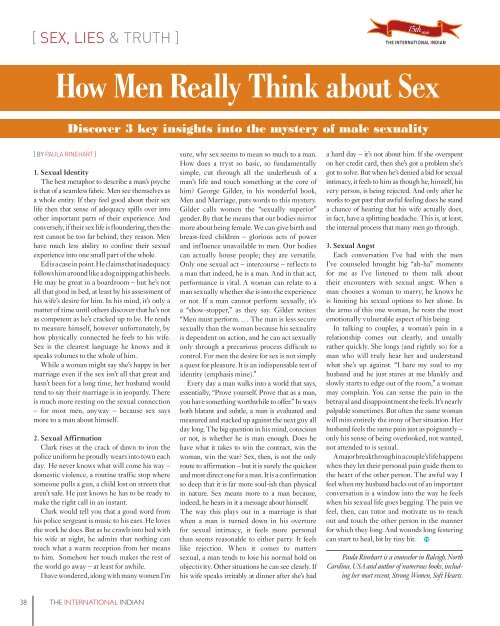THE INTERNATIONAL - International Indian
THE INTERNATIONAL - International Indian
THE INTERNATIONAL - International Indian
Create successful ePaper yourself
Turn your PDF publications into a flip-book with our unique Google optimized e-Paper software.
[ SEX, LIES & TRUTH ]<br />
How Men Really Think about Sex<br />
Discover 3 key insights into the mystery of male sexuality<br />
[ by PaULa RInEHaRT ]<br />
1. Sexual Identity<br />
The best metaphor to describe a man’s psyche<br />
is that of a seamless fabric. Men see themselves as<br />
a whole entity. If they feel good about their sex<br />
life then that sense of adequacy spills over into<br />
other important parts of their experience. And<br />
conversely, if their sex life is floundering, then the<br />
rest cannot be too far behind, they reason. Men<br />
have much less ability to confine their sexual<br />
experience into one small part of the whole.<br />
Ed is a case in point. He claims that inadequacy<br />
follows him around like a dog nipping at his heels.<br />
He may be great in a boardroom – but he’s not<br />
all that good in bed, at least by his assessment of<br />
his wife’s desire for him. In his mind, it’s only a<br />
matter of time until others discover that he’s not<br />
as competent as he’s cracked up to be. He tends<br />
to measure himself, however unfortunately, by<br />
how physically connected he feels to his wife.<br />
Sex is the clearest language he knows and it<br />
speaks volumes to the whole of him.<br />
While a woman might say she’s happy in her<br />
marriage even if the sex isn’t all that great and<br />
hasn’t been for a long time, her husband would<br />
tend to say their marriage is in jeopardy. There<br />
is much more resting on the sexual connection<br />
– for most men, anyway – because sex says<br />
more to a man about himself.<br />
2. Sexual Affirmation<br />
Clark rises at the crack of dawn to iron the<br />
police uniform he proudly wears into town each<br />
day. He never knows what will come his way –<br />
domestic violence, a routine traffic stop where<br />
someone pulls a gun, a child lost on streets that<br />
aren’t safe. He just knows he has to be ready to<br />
make the right call in an instant.<br />
Clark would tell you that a good word from<br />
his police sergeant is music to his ears. He loves<br />
the work he does. But as he crawls into bed with<br />
his wife at night, he admits that nothing can<br />
touch what a warm reception from her means<br />
to him. Somehow her touch makes the rest of<br />
the world go away – at least for awhile.<br />
I have wondered, along with many women I’m<br />
sure, why sex seems to mean so much to a man.<br />
How does a tryst so basic, so fundamentally<br />
simple, cut through all the underbrush of a<br />
man’s life and touch something at the core of<br />
him? George Gilder, in his wonderful book,<br />
Men and Marriage, puts words to this mystery.<br />
Gilder calls women the “sexually superior”<br />
gender. By that he means that our bodies mirror<br />
more about being female. We can give birth and<br />
breast-feed children – glorious acts of power<br />
and influence unavailable to men. Our bodies<br />
can actually house people; they are versatile.<br />
Only one sexual act – intercourse – reflects to<br />
a man that indeed, he is a man. And in that act,<br />
performance is vital. A woman can relate to a<br />
man sexually whether she is into the experience<br />
or not. If a man cannot perform sexually, it’s<br />
a “show-stopper,” as they say. Gilder writes:<br />
“Men must perform. … The man is less secure<br />
sexually than the woman because his sexuality<br />
is dependent on action, and he can act sexually<br />
only through a precarious process difficult to<br />
control. For men the desire for sex is not simply<br />
a quest for pleasure. It is an indispensable test of<br />
identity (emphasis mine).”<br />
Every day a man walks into a world that says,<br />
essentially, “Prove yourself. Prove that as a man,<br />
you have something worthwhile to offer.” In ways<br />
both blatant and subtle, a man is evaluated and<br />
measured and stacked up against the next guy all<br />
day long. The big question in his mind, conscious<br />
or not, is whether he is man enough. Does he<br />
have what it takes to win the contract, win the<br />
woman, win the war? Sex, then, is not the only<br />
route to affirmation – but it is surely the quickest<br />
and most direct one for a man. It is a confirmation<br />
so deep that it is far more soul-ish than physical<br />
in nature. Sex means more to a man because,<br />
indeed, he hears in it a message about himself.<br />
The way this plays out in a marriage is that<br />
when a man is turned down in his overture<br />
for sexual intimacy, it feels more personal<br />
than seems reasonable to either party. It feels<br />
like rejection. When it comes to matters<br />
sexual, a man tends to lose his normal hold on<br />
objectivity. Other situations he can see clearly. If<br />
his wife speaks irritably at dinner after she’s had<br />
a hard day – it’s not about him. If she overspent<br />
on her credit card, then she’s got a problem she’s<br />
got to solve. But when he’s denied a bid for sexual<br />
intimacy, it feels to him as though he, himself, his<br />
very person, is being rejected. And only after he<br />
works to get past that awful feeling does he stand<br />
a chance of hearing that his wife actually does,<br />
in fact, have a splitting headache. This is, at least,<br />
the internal process that many men go through.<br />
3. Sexual Angst<br />
Each conversation I’ve had with the men<br />
I’ve counseled brought big “ah-ha” moments<br />
for me as I’ve listened to them talk about<br />
their encounters with sexual angst. When a<br />
man chooses a woman to marry, he knows he<br />
is limiting his sexual options to her alone. In<br />
the arms of this one woman, he rests the most<br />
emotionally vulnerable aspect of his being.<br />
In talking to couples, a woman’s pain in a<br />
relationship comes out clearly, and usually<br />
rather quickly. She longs (and rightly so) for a<br />
man who will truly hear her and understand<br />
what she’s up against. “I bare my soul to my<br />
husband and he just stares at me blankly and<br />
slowly starts to edge out of the room,” a woman<br />
may complain. You can sense the pain in the<br />
betrayal and disappointment she feels. It’s nearly<br />
palpable sometimes. But often the same woman<br />
will miss entirely the irony of her situation. Her<br />
husband feels the same pain just as poignantly –<br />
only his sense of being overlooked, not wanted,<br />
not attended to is sexual.<br />
A major breakthrough in a couple’s life happens<br />
when they let their personal pain guide them to<br />
the heart of the other person. The awful way I<br />
feel when my husband backs out of an important<br />
conversation is a window into the way he feels<br />
when his sexual life goes begging. The pain we<br />
feel, then, can tutor and motivate us to reach<br />
out and touch the other person in the manner<br />
for which they long. And wounds long festering<br />
can start to heal, bit by tiny bit.<br />
Paula Rinehart is a counselor in Raleigh, North<br />
Carolina, USA and author of numerous books, including<br />
her most recent, Strong Women, Soft Hearts.<br />
38<br />
<strong>THE</strong> <strong>INTERNATIONAL</strong> INDIAN
















